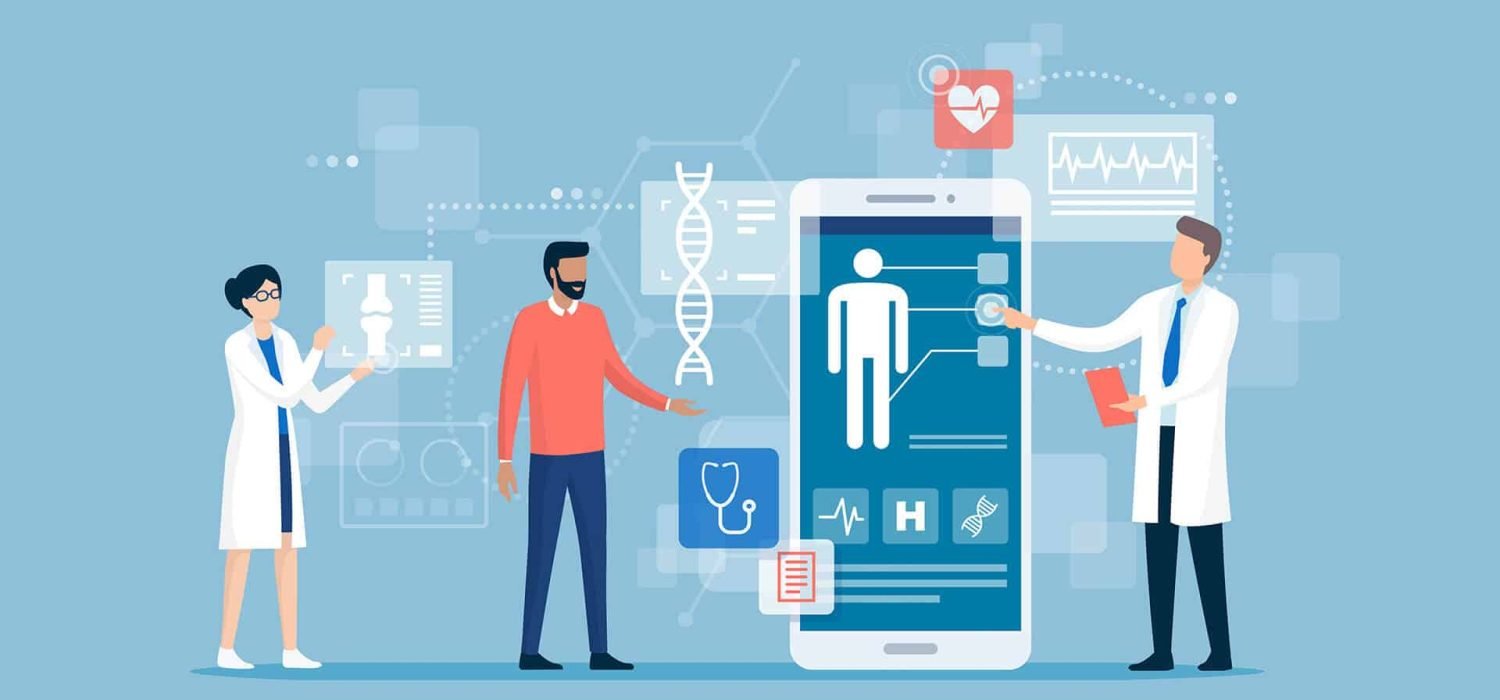The healthcare industry is undergoing a profound revolution, thanks to digital transformation. In an era where technology is reshaping every aspect of our lives, it’s no surprise that healthcare has also embraced the digital wave.
From electronic health records to telemedicine, artificial intelligence to wearable devices, the possibilities seem endless.
This blog delves into the remarkable impact of digital transformation on healthcare, exploring how it has improved patient care, increased efficiency, and transformed the way healthcare is delivered.
Discover the exciting advancements that are revolutionizing the industry and shaping a future where technology and healthcare converge seamlessly for the benefit of all.
Understanding Digital Transformation in Healthcare
In the fast-paced digital age, the healthcare industry is undergoing a remarkable transformation, revolutionizing the way healthcare is delivered and experienced. Digital transformation in healthcare refers to the integration and utilization of advanced technologies to enhance patient care, improve efficiency, and drive innovation.
From the digitization of medical records to the advent of telemedicine, the possibilities seem endless, empowering both patients and healthcare providers with unprecedented opportunities.
At the heart of this transformation are key technologies that have become the pillars of change. Electronic health records (EHRs) have paved the way for seamless data management, allowing healthcare professionals to access and share patient information effortlessly. Gone are the days of lost or illegible paper records, as EHRs provide a centralized, secure, and accessible repository of critical health data.
One of the most significant advancements is the rise of telemedicine, enabling remote consultations and virtual care. With telemedicine, geographical barriers are transcended, and healthcare becomes accessible to individuals in remote areas or those with mobility constraints.
Patients can now consult with specialists, receive diagnoses, and even get prescriptions without leaving their homes, promoting convenience, efficiency, and timely care.
Artificial Intelligence (AI) has emerged as a game-changer in healthcare, facilitating accurate diagnoses, predictive analytics, and personalized treatment plans. AI-powered algorithms can analyze vast amounts of patient data, identify patterns, and provide valuable insights to healthcare professionals, leading to improved decision-making and better patient outcomes.
Moreover, AI-powered chatbots and virtual assistants offer round-the-clock support, answering basic medical queries and assisting patients in self-management.
The Internet of Things (IoT) has also found its way into healthcare, connecting medical devices and wearables to gather real-time patient data. From heart rate monitors and glucose meters to fitness trackers and smartwatches, these devices provide a continuous stream of information, enabling proactive health management and remote patient monitoring.
Healthcare providers can monitor vital signs, detect anomalies, and intervene promptly, enhancing patient safety and reducing hospital readmissions.
With these transformative technologies, the healthcare industry is experiencing a paradigm shift, embracing data-driven decision-making, collaboration, and patient-centric care.
The digital transformation in healthcare is not only improving patient outcomes but also revolutionizing the entire healthcare ecosystem. From physicians and nurses to administrators and patients, everyone stands to benefit from the incredible advancements that digital transformation brings.
Improved Patient Care and Outcomes
In the era of digital transformation, patient care and outcomes have witnessed significant improvements, thanks to the integration of advanced technologies.
Telemedicine has emerged as a game-changer, enhancing accessibility to healthcare services and revolutionizing the way patients receive care. Virtual consultations allow patients to connect with healthcare providers remotely, eliminating the need for long waits and unnecessary travel.
This not only promotes convenience but also ensures timely access to medical expertise, particularly for individuals residing in remote areas or those with limited mobility.
Moreover, artificial intelligence (AI) has revolutionized the diagnosis and treatment landscape.
AI-powered tools can analyze vast amounts of patient data, enabling healthcare professionals to make accurate and timely diagnoses. Predictive analytics further assist in identifying high-risk patients and initiating preventive interventions.
With personalized medicine, treatment plans can be tailored to an individual’s genetic makeup, optimizing efficacy and minimizing adverse effects. These advancements have the potential to significantly improve patient outcomes, leading to faster recoveries and better overall quality of life.
Increased Efficiency and Cost Savings
Digital transformation has brought about substantial improvements in the efficiency of healthcare delivery, resulting in cost savings and resource optimization. The adoption of electronic health records (EHRs) has streamlined administrative processes, eliminating the need for extensive paperwork and reducing the risk of errors.
With instant access to patient data, healthcare providers can make informed decisions quickly, leading to more efficient and effective care.
Furthermore, digital transformation has led to a reduction in medical errors and improved patient safety. EHRs facilitate accurate documentation and information sharing among healthcare professionals, ensuring seamless coordination and continuity of care.
Decision support systems powered by AI provide real-time clinical guidance, aiding healthcare providers in making evidence-based decisions and avoiding potential errors.
By embracing data analytics, healthcare organizations can identify areas of inefficiency and optimize resource allocation. Predictive analytics can help forecast patient admissions, allowing hospitals to adjust staffing levels accordingly.
Additionally, digital transformation has enabled remote patient monitoring and wearable devices, allowing for proactive health management. This not only reduces hospital readmissions but also empowers individuals to take charge of their own health, leading to long-term cost savings and improved overall well-being.
Transforming Healthcare Delivery
Digital transformation has brought about a paradigm shift in healthcare delivery, reimagining the way healthcare services are provided, accessed, and coordinated. Telehealth platforms have revolutionized care delivery, breaking down geographical barriers and ensuring equal access to quality healthcare.
Patients can now receive specialized care from renowned experts regardless of their physical location, enabling timely interventions and reducing the burden on overburdened healthcare systems.
Collaborative healthcare platforms and data sharing have enhanced care coordination among multiple providers, enabling seamless information exchange and a comprehensive view of patients’ medical history.
This ensures a holistic approach to care and reduces the chances of fragmented or duplicative treatments. Furthermore, digital platforms facilitate secure and efficient communication between healthcare professionals, enhancing teamwork and enabling interdisciplinary collaboration.
Patient engagement has also been significantly enhanced through digital transformation. Mobile apps and patient portals empower individuals to access their health records, schedule appointments, and communicate with healthcare providers conveniently.
This increased engagement promotes shared decision-making and empowers patients to actively participate in their care, leading to improved health outcomes and patient satisfaction.
Addressing Challenges and Concerns
While digital transformation has revolutionized healthcare, it also presents challenges that need to be addressed to ensure its successful implementation. One of the major challenges of digital transformation in healthcare is data privacy and security.
With the increased digitization of health records and the sharing of sensitive patient information, robust cybersecurity measures must be in place to protect against data breaches and unauthorized access. Strict compliance with privacy regulations and the use of encryption techniques are crucial in safeguarding patient data.
Another challenge is ensuring interoperability and seamless integration of digital systems. Healthcare organizations must ensure that different technologies and systems can communicate and share information effectively.
This requires the development of standardized protocols and the adoption of interoperability standards, enabling the exchange of data across various platforms and systems.
Additionally, overcoming resistance to change and fostering digital literacy among healthcare professionals are essential. Training programs should be implemented to equip healthcare providers with the necessary skills and knowledge to navigate and effectively utilize digital tools.
Collaboration between technology developers and healthcare professionals is vital in designing user-friendly and intuitive interfaces that support seamless integration into existing workflows.
Future Trends and Possibilities
As technology continues to advance, the future of digital transformation in healthcare holds immense potential. Emerging technologies such as blockchain, virtual reality (VR), and 5G networks are expected to further revolutionize the industry.
Blockchain technology can enhance the security and privacy of health records, while VR can facilitate immersive training experiences for healthcare professionals. The high-speed connectivity offered by 5G networks will enable real-time data transmission and support the widespread adoption of telemedicine.
Furthermore, artificial intelligence and machine learning will play an increasingly significant role in diagnostics, drug discovery, and personalized medicine.
AI algorithms will continue to evolve, becoming more accurate and efficient in diagnosing complex conditions and predicting treatment outcomes. The integration of big data and predictive analytics will enable early disease detection, preventive interventions, and population health management.
The impact of digital transformation on the healthcare industry is profound, and the possibilities for innovation and improvement are vast.
As technology continues to evolve, it is crucial for healthcare organizations and professionals to embrace these advancements and harness their full potential to provide high-quality, accessible, and patient-centered care.
Conclusion
The impact of digital transformation in the healthcare industry is undeniable. It has revolutionized patient care and outcomes by leveraging technologies like telemedicine, AI, and wearable devices.
Accessibility to healthcare services has improved, personalized medicine has become a reality, and patient engagement has been enhanced. Moreover, digital transformation has increased efficiency, reduced costs, and optimized resource allocation, leading to better overall healthcare delivery.
While challenges such as data security and interoperability need to be addressed, the future holds immense potential for continued innovation. Embracing the possibilities offered by digital transformation, healthcare organizations can partner with a reliable Digital Transformation Company to drive further advancements and shape a brighter future for healthcare.
Author Bio:- Hemang Trambadia
Hemang is a skilled digital marketing expert at Peerbits who has worked with a variety of businesses, He has worked with a variety of businesses, from small startups to large corporations, and has helped them increase their online presence and drive more traffic to their websites. His expertise lies in search engine optimization (SEO), pay-per-click advertising (PPC), social media marketing, and email marketing. He is skilled at creating data-driven marketing campaigns that deliver results and is always up-to-date on the latest digital marketing trends and techniques. When he’s not working, Hemang enjoys watching movies and traveling.






